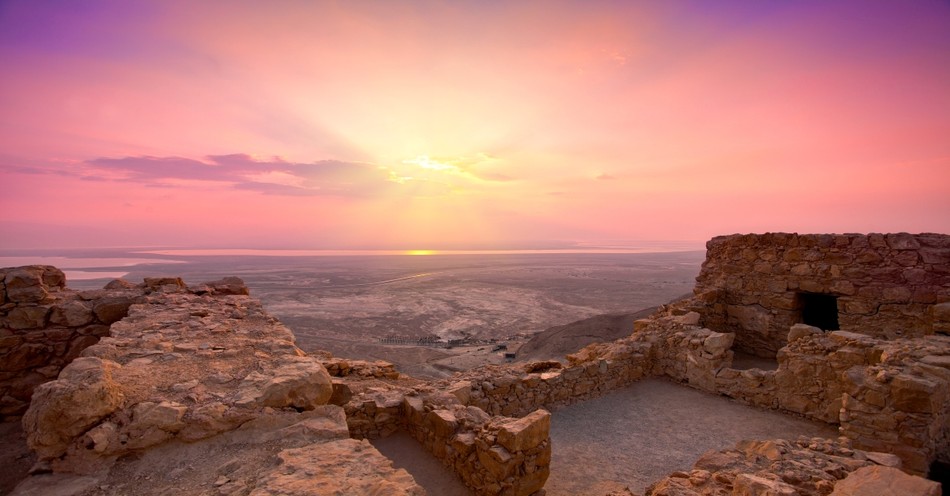The region of Judea extended west of the Jordan River and encompassed the southernmost part of the area. The Mediterranean Sea hugged the land’s east coast and shared its northern border with Samaria. Easton’s Bible Dictionary explains, “After the Captivity this name was applied to the whole of the country west of the Jordan But under the Romans, in the time of Christ, it denoted the southernmost of the three divisions of Palestine, although it was also sometimes used for Palestine generally.”
Many important historical events happened in the area of Judea. After the Israelite Tribes resided there, the region was split when its leaders turned from God. After many years of turmoil, the people returned to Judea but struggled to rebuild what was lost. God used his people to turn the Israelites back toward him and continue his great story.
What Israelite Tribes Lived in the Region of Judea?
Several tribes lived in the region of Judea—including the tribes of Judah, Benjamin, Dan, Simeon, and part of the tribe of Ephraim. The tribes varied in both size and favor. Let’s take a closer look at the different communities that inhabited Judea.
The tribe of Simeon fell out of favor with Jacob. In anger and rage, Simeon and his brother, Levi, attacked the Shechemites who had defiled their sister, Dinah. Because of this, their father Jacob cursed their communities. This effect is seen in the small size of the tribe of Simeon. In contrast, the people shared a border with the powerful tribe of Judah.
Jesus himself came from the tribe of Judah. Jacob prophesies a great future for this community in the book of Genesis. Genesis 49:8-10 reads, “Judah, your brothers will praise you…your father’s sons will bow down to you...Like a lion he crouches and lies down… The scepter will not depart from Judah [until] the obedience of the nations shall be his.” These verses emphasize the great power and adoration of the people.
On the other hand, Jacob referred to the tribe of Dan as a snake. Even though the people were promised fertile land, they disrupted a peaceful tribe to gain their inheritance. Its people also began worshipping false idols, and the group’s name is left out of the tribes mentioned in the Tribulation in the book of Revelation.
Despite the tribe of Benjamin’s small size, it adopted a warlike mentality. In Genesis 49:27, Jacob declares the community “a ravenous wolf; in the morning he devours the prey, in the evening he divides the plunder.” Notably, Paul came from this tribe, proving those dedicated to Christ can make a great impact for him no matter where they come from.
Lastly, the tribe of Ephraim came from the tribe of Joseph along with the tribe of Manasseh. Ephraim and Manasseh were Joseph’s sons that Jacob adopted as his own. Before his death, Jacob blessed his grandsons, putting Ephraim ahead of Manasseh even though he was younger. Consequently, the tribe of Ephraim became greater than that of his brother’s territory.
When Did the Israelite Tribes Split?
The Israelite tribes split shortly after the death of King Solomon. Solomon inherited the land of Israel after his father, King David’s death. At first, he followed the ways of the Lord but was drawn to love many women. Even though polygamy was normal in the culture, God did not ordain it any more than he ordained the Israelites to marry surrounding nations. 1 Kings 11:2 says, “They were from nations about which the LORD had told the Israelites, ‘You must not intermarry with them, because they will surely turn your hearts after their gods.” Nevertheless, Solomon held fast to them in love.
Solomon had 700 wives and 300 concubines. The women swayed his heart toward their false gods angering God. In 1 Kings 11:11, God tells Solomon, “So the LORD said to Solomon, “Since this is your attitude and you have not kept my covenant and my decrees, which I commanded you, I will most certainly tear the kingdom away from you and give it to one of your subordinates” Out of admiration for Solomon’s father, David, God decided to keep the kingdom intact during his lifetime. His son, Rehoboam, would not be so lucky.
After Solomon died, Rehoboam became king. The people had grown resentful of the hard labor demanded by his father and asked the new ruler to lighten the load. Rehoboam refused, and the larger northern region split from the smaller southern region. A prophesized king, Jeroboam, ruled Israel, and Rehoboam remained in control of the smaller land, Judah.
When Did the Israelites Resettle in Judea?
The Israelites turned from God and began worshipping false idols. Because of this, they faced oppression and exile. After many years of unsuitable and destructive kings, Josiah encouraged the people to turn back to God and follow his ways. Unfortunately, he died in battle, leaving his son, Jehoahaz, in charge. However, Jehoahaz only lasted three pitiful months as king. Jehoiakim succeeded him, and during his reign, the Babylonians invaded Judah. Jehoiakim’s son Jehoiachin became king when his father died. During this time, the Babylonians sieged Jerusalem and later captured Jehoiachin. They ransacked the temple and sent Jerusalem into exile.
The kings of Judah continued to rule with duplicity and greed. The prophet Jeremiah urged the people to return to God, but they didn’t listen. One day, Nebuchadnezzar, king of Babylon, sieged Jerusalem. Famine broke out. The current king, Zedekiah, wanted Jeremiah to ask God for help. Instead, the people would feel the consequences of their sins. Jeremiah 21:10 reads, “I have determined to do this city harm and not good, declares the LORD. It will be given into the hands of the king of Babylon, and he will destroy it with fire.’”
Jerusalem fell, and Judah became captive, but not all hope was lost. Ezekiel 36:33 says, “‘This is what the Sovereign LORD says: On the day I cleanse you from all your sins, I will resettle your towns, and the ruins will be rebuilt.” The Babylonian control would be temporary. Several kings later, the Babylonians fell to the Persians in 539 B.C. The new ruler, King Cyrus, issued a decree: the Jewish exiles would return to Jerusalem. About 70 years after the people were first exiled, their journey home began.
King Cyrus also returned the temple’s belongings stolen by Nebuchadnezzar. About 50,000 people returned to Judah. This time they set their priorities straight, rebuilding the altar and laying the foundation for the temple. Zechariah 8:14-15 states, “This is what the LORD Almighty says: “Just as I had determined to bring disaster on you and showed no pity when your ancestors angered me,” says the LORD Almighty, “so now I have determined to do good again to Jerusalem and Judah. Do not be afraid.”
After some time and encouragement by the prophets Haggai and Zechariah, the temple was completed on March 12, 516 B.C.
About 70 years later, the prophet Nehemiah went on a mission to rebuild the city’s walls. Without the protection, the city remained vulnerable and defenseless. Their neighbors, however, felt threatened by this idea. Under Nehemiah’s leadership, the people continued with their project. When opposition occurred, half of the men worked on the wall, and the others stood guard. After 52 days, the wall was completed, but some people continued to stray from the Lord. Nehemiah brought the people together and read from God’s Word, and the Israelites turned back toward God.
This period was followed by 400 years of silence in the Bible. However, history continued. The Maccabees revolted against the Seleucids in the second century B.C. when Antiochus IV Epiphanes tried to rid the area of Jewish culture. Many important writings were also recorded during this period—including the books of Isaiah, the Psalms, and Deuteronomy by the Qumran community. After many years of silence, scripture picks up again in the gospels with the story of Jesus’ birth.
What Had Happened to Judea in Jesus’ Time?
The Romans ruled Judea during Jesus’ time. Archelaus ruled over Judea from 4 B.C. to 6 A.D. The Romans were unhappy with his ruling and stripped him of his authority, leading to various other leaders. One of these well-known governors was Pontius Pilate, who held control from 26 A.D. to 36 A.D., including the time of Jesus’ crucifixion.
After Jesus was captured in the Garden of Gethsemane, the chief priests and elders conspired to kill him. They brought him before Pilate, the governor of Judea at the time. Pilate asked Jesus if he was king of the Jews. In Matthew 27:11, Jesus replied, “You have said so.” Pilate relayed the other chargers the people had brought against him, but Jesus remained silent.
Later at the banquet, it was common for Pilate to release a prisoner. Pilate asked the crowd who they would rather have released—the well-known criminal Barabbas or Jesus. The crowd urged Pilate to release Barabbas, even though Jesus had committed no crime. Instead, the people shouted for Jesus to be crucified. Pilate didn’t want to be responsible for Jesus’s sentence, but when he saw the crowd beginning to riot, he sent him to be crucified anyway.
What Happened to Judea after Jesus’ Time?
After Jesus’ time, Judea was ruled by various Roman procurators. A Jewish historian named Josephus recounts the evil ways of the rulers. This caused the Jewish people to revolt from A.D. 66-73/74. The Romans would not tolerate revolt in Palestin’s important commercial trade center. They sent future emperors Vespasian and his son Titus to suppress the people, which they did in a wicked way. Jerusalem and the temple were destroyed. The Jewish people tried another unsuccessful uprising but were banished from the areas.
Throughout the Bible, Judea has a long history. The land stands as a witness to the many ups and downs we find in our Christian walk. The people strayed from the Lord, but God remained faithful. He sent prophets to speak to their hearts and turn their eyes back to him. God knew there would always be sin in the world, so he sent his Son, Jesus, to be crucified. His death and resurrection cover the spiritual imperfection in the world. While we may stray, as his followers, we can always return to the Promised Land and live in communion with Christ.
Additional Sources: The Story: The Bible As One Continuing Story of God and His People. (Grand Rapids, MI: Zondervan, 2005, 2008) pg. 143-253.
Further Reading:
9 Interesting Facts about the Tribe of Judah
Judea Definition — Quick Reference Dictionary
The Mountainous Country of Judea
Photo Credit: Getty Images/vvvita

Jenna Brooke Carlson is an elementary dual language teacher in the Chicago suburbs. As a member of American Christian Fiction Writers and Word Weavers, she enjoys spending time with other writers and perfecting her craft. Her debut novel, Falling Flat, spreads the message that healing can occur, even after tragedy. Along with writing, she’s pursuing her dreams of creating a community of brave young women, who she can encourage to live out their dreams amid challenges and imperfection. Her days are busy, but she’s determined she can conquer anything with a fuzzy blanket and a hot cup of tea. To find out more about Jenna, visit her website at jennabrookecarlson.com.
This article is part of our Bible resource for understanding the significance and meaning of biblical phrases and ideas. Here are our most popular Bible articles to grow in your knowledge of God's Word:
Promises of God in the Bible
Is "This Too Shall Pass" in the Bible?
What Was the Ark of the Covenant?
Top 10 Bible Stories for Kids
“Iron Sharpens Iron” in Proverbs 27:17
"Fearfully and Wonderfully Made" in Psalm 139
“Be Still and Know That I am God” in Psalm 46:10
"No Weapon Formed Against Me Shall Prosper" - Isaiah 54:17



